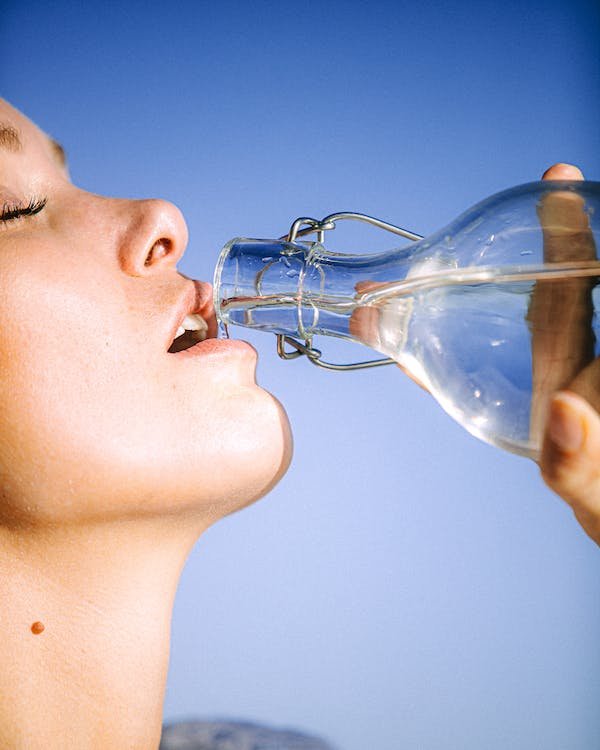How to Prevent Water Intoxication and Dehydration.
Beautiful morning to you friends from this part of the world, we didn't have the best of weekends because politicians once again refused to allow citizens to cast their vote peacefully, I have never seen a place where people fight, struggle, and kill to become leaders, it happens only in Nigeria, and that is to tell you they are not ready to serve the people, they are only doing it for their own personal greed and to fulfill their already-occupied bellies(occupied with stolen public funds). Anyways, I just had to rant a little because it has been a very annoying process of the election so far, but I hope you are doing well wherever you are friends and welcome to the beginning of a new week.
Today, I want to write on water intoxication, we have always heard about how important water is, and we have been told not to go a day without water even if we want to go days without food, we have also been advised to consume as much water as we can as it helps with our body system functionality. However, there has to be a limit to everything because when water is taken excessively, it could result in water intoxication.

pexels.com
Water intoxication can happen in various clinical settings, but generally, it is not usually well recognized in medical literature, early detection will help prevent serious hyponatraemia leading to seizures, coma, and eventual death, just so we are aware that water intoxication is not a thing to be taken likely. So the question about how it happens, and what can be done to prevent it amongst other things is what we will be answering as we move along in this post.
There are people who claim the impossibility of them taking in excessive water at a time by accident, but then it could happen, probably because of overhydration during a sporting event or intense training. Other terminologies to describe the occurrence of water intoxication are; water toxemia, water poisoning, and hyperhydration.
Water Intoxication is a disruption of brain function caused by drinking excessive water, when excessive water enters the body, the amount of water in the blood is increased, diluting the electrolytes, especially sodium in the blood. When the level of sodium in the blood falls below 135 millimoles per liter, it is called hyponatremia. Bear in mind that, sodium helps to maintain fluid balance in and out of cells, so when sodium level drops as a result of excessive water consumption, the fluids will travel from the outside to the inside of cells, causing swelling. When this happens to brain cells, it could turn out to be highly dangerous and life-threatening too.
With water consumed excessively, the cells in the brain begin to swell and there comes an increased pressure inside the skull, this produces the first symptom of water intoxication which includes; nausea, headaches, and vomiting. Symptoms could get worse and the person begins to feel; drowsiness, double vision, muscle weakness, increased blood pressure, confusion, breathing difficulty, and inability to identify sensory information.
When there is a build-up of fluid in the brain, it is called cerebral edema, this can affect the brain stem and cause central nervous system dysfunction. In highly severe cases, the intoxication of water can cause, brain damage, coma, and eventual death.
Water intoxication is definitely something we hear about on a daily basis, it is rare as I mentioned earlier, but it is common amongst people who go through some form of endurance training or the practice of a strenuous sporting event, or in people who have a serious mental health condition also called, psychogenic polydipsia, which can be a symptom of various mental health conditions. With all of this discovery, then it is safe to ask, how much of this water is really too much?
Overhydration and water intoxication happen when there is a high level of water consumption that the body can take. The kidney has the capacity to only remove 0.8-1.0 liters of water every hour, a high level of water intake will upset the body's electrolyte balance, so when there is more water consumption than the body can get rid of through urine, it will create a problem. The amount of water consumed is not the only problem here, but also the time for the water consumption, in order to out space the kidneys, it is necessary not to drink more water than the kidney can comfortably eliminate. Drinking about 3-4 liters of water within a short period may just be too much according to experts, some people also say it is drinking more than 5 liters of water within a few hours.

pexels.com
There are no official guidelines about the amount of water to be consumed daily, according to Centers for Disease Control and Prevention (CDC)Trusted Source, the appropriate amount of water to be consumed is largely dependent on level weight, climate, level of physical activity and sometimes if a mother is breastfeeding.
Those from ages 19 and above are advised to take 3.7 liters for men and 2.7 liters for women in a day, also bear in mind that the overall fluid intake on a daily basis also has to do with anything you drink or eat that has water in it, like vegetables and fruits. In total, men should consume around 13 cups of beverages and women 9 cups.
The fact that you are reading about water intoxication does not mean you have to reduce the amount of water you take as water is still very essential for the body, just be watchful with it, you shouldn't stop taking water in its sufficiency because;
- Water helps to keep body temperature within its normal range.
- It helps to protect the spine and other tissues.
- It helps to keep the body temperature within a normal range.
- It helps with the elimination of waste through sweat, urine, and bowel movements.
Consuming lots of water would help your skin glow and look very beautiful, as the skin is the body's largest organ, with sufficient water consumption, the body is kept hydrated and healthy and because water contains zero calories, it is an excellent tool for weight management too.
On the other hand, when water is not taken sufficiently, very little water there is also the problem of Dehydration.
The body is regularly losing fluids through actions like urinating and sweating, dehydration happens when the body loses more fluid than it takes in. Dehydration comes with symptoms of being thirsty excessively to feeling highly fatigued, you can also notice frequent urination or dark urine, dehydration could lead to a dry mouth and a dry tongue, the inability to produce tears while crying too.
Dehydration could lead to; unclear thinking or confusion, constipation, overheating, mood change, shock, kidney stone formation, and shock. If the dehydration is at a mild level, drinking more water and other fluids could solve the problem, but in the case of severe dehydration, treatment will be gotten at the hospital.
It is easier to meet up with water consumption goals while eating or while being thirsty, but when none of that is happening, you still have to drink lots of water, you can achieve that by;
Moving around with a water bottle even if you are at the office, on a road trip, or gym.
Take other fluids, it doesn't always have to be plain water, other fluid sources like tea, broth, milk, and pure fruit are good options.
Stay away from sugary drinks, because we have mentioned that water can be gotten from fluids is not an excuse to consume more sugar, stay away from juice, alcohol, and soda as these beverages contain high calories and should never be a substitute for water, in any case still choose to drink water.
You can add an extra touch to your normal water by squeezing in some fresh lemon or lime juice.
The next time you go out to eat, order an extra glass of water instead of ordering another beverage.
While working out, a sports drink containing electrolytes will help to regain the one you have lost during the course of the workout process.
Conclusion.
Learning how to do everything in moderation is important and that includes even water intake, water intoxication as well as dehydration are very real and needs to be avoided as much as possible, so be careful of the amount of water taken into the body, ensure it is neither too much nor too little.
References.
https://www.healthline.com/health/how-much-water-can-kill-you#causes
https://www.webmd.com/diet/what-is-too-much-water-intake
https://www.ncbi.nlm.nih.gov/pmc/articles/PMC1770067/
https://www.mainlinehealth.org/blog/water-intoxication
https://svalbardi.com/blogs/water/overhydration
https://www.ncbi.nlm.nih.gov/pmc/articles/PMC1770067/
https://www.healthline.com/health/overhydration#_noHeaderPrefixedContent
https://www.medicalnewstoday.com/articles/318623#tips

Hi, I am Tobi a writer, speaker, relationship blogger, and lover of good music. I love making friends and learning from people. Want to hear me speak on relationships and general life issues, you can find my youtube channel where you can listen and watch any episode for free, do not forget to subscribe and share with friends. I sincerely appreciate every love I get from members of the community and do well to keep them coming.
To think that this same water that we are always advised to regularly take could have such side effects is actually bothering and scary, it's a good thing to know that we need to be minimal with everything we do.
It's just the time frame, taking excessive water within a short time frame is calling for trouble, appreciate your comment, thank you.
It's just the time frame, taking excessive water within a short time frame is calling for trouble, appreciate your comment, thank you.
The problem isn't so much that we drink an excessive amount of water as it is that we drink an excessive amount of water in a short period of time.
Every so often there are bets on who can drink 1 gallon/3.8 liters of milk within 20 minutes without vomiting. In nearly all cases, whoever drinks that amount of milk in 20 minutes vomits and loses the bet. It turns out to be true for something as simple as water.
Why would someone vomit after drinking that amount of water rather than milk in 20 minutes? You touched on it in your post: the body can't adjust its electrolyte balance in so short a time for so much fluid. It throws everything out of whack. 1 gallon/3.8 liters of water over 2 hours is doable; but in 20 minutes, that is asking for trouble.
I tell you friend, it is indeed asking for trouble, and yes it is not even about taking much water, it all boils down to the time frame. Thanks for the comment, appreciated.
This is true. I didn't know this until I read your post, but it makes sense that overloading the kidneys would cause problems.
Thanks for your contribution to the STEMsocial community. Feel free to join us on discord to get to know the rest of us!
Please consider delegating to the @stemsocial account (85% of the curation rewards are returned).
Thanks for including @stemsocial as a beneficiary, which gives you stronger support.